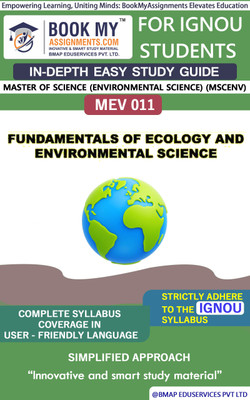IGNOU MEV 11 Fundamentals of Environmental Science and Ecology In Depth Guide For Ignou Student(Paperback, BMA Publication)
Quick Overview
Product Price Comparison
IGNOU's MEV 11 (Fundamentals of Environmental Science and Ecology) course provides a comprehensive understanding of the basic principles and concepts in environmental science and ecology. Here's an in-depth guide to help you excel in your studies:Understand the Syllabus: Begin by thoroughly reviewing the syllabus provided by IGNOU for the MEV 11 course. This will outline the topics you need to cover and the structure of the course.Study Material: Utilize the study materials provided by IGNOU for the course. These materials typically cover fundamental concepts in environmental science and ecology, including ecosystems, biodiversity, pollution, climate change, and conservation.Textbooks and References: Supplement your study materials with textbooks and reference books on environmental science and ecology. Some recommended textbooks include "Environmental Science" by G. Tyler Miller and "Ecology: Concepts and Applications" by Manuel C. Molles Jr.Understanding Environmental Concepts: Environmental science covers a wide range of topics, including ecology, environmental chemistry, environmental physics, environmental geology, and environmental economics. Make sure you have a basic understanding of these concepts and their interrelationships.Ecological Principles: Study the fundamental principles of ecology, such as the ecosystem concept, energy flow, nutrient cycling, ecological succession, and population dynamics. Understand how these principles apply to different ecosystems and their management.Environmental Issues: Familiarize yourself with major environmental issues facing the world today, such as climate change, air and water pollution, deforestation, loss of biodiversity, and resource depletion. Understand the causes, consequences, and potential solutions to these issues.Case Studies: Explore real-life case studies and examples related to environmental science and ecology. Analyze how environmental problems are addressed in different regions and contexts, and evaluate the effectiveness of various strategies and interventions.Environmental Laws and Policies: Study environmental laws and policies at the national and international levels. Understand the role of governments, organizations, and individuals in addressing environmental challenges and promoting sustainability.


